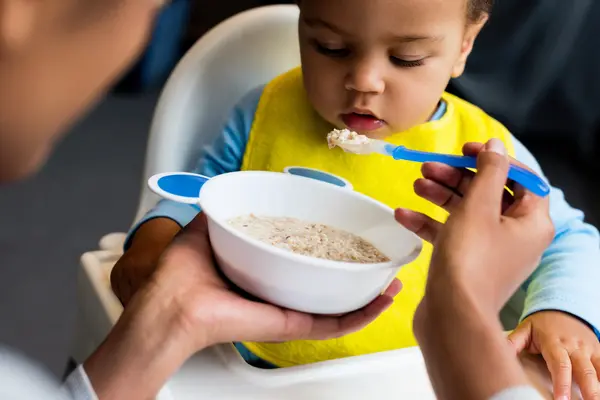If introducing solid foods into your baby’s diet has you panicking, this post is for you. Transitioning baby to solid foods can be a time for anxiety for some moms. Wondering what to feed them and how much and how often. Not to fear, here are a few tips to get you off to a good start.
Tips For Introducing Solids to Baby
Start solids when your baby is around 4-6 months of age.
Most public health organizations recommend exclusively breastfeeding for the first 4 months. Your baby should be able to sit unassisted, hold up their head, and show interest in mealtime prior to starting solids.
If your baby pushes the food back out with their tongue, they may not be ready. If this happens, just wait a week or so and try again. This is just your babies tongue-thrust reflex which he will lose with time.
Introduce new foods one at a time and wait 2-3 days in between new flavors.
This will help you identify food allergies or sensitivities in your baby. If you notice a rash, diarrhea, or vomiting stop feeding that food and consult a pediatrician.
Rice cereal has long been a recommended first food, but that seems to be up for debate.
Cereals have long been touted as the best first food because they are fortified with iron and other nutrients that infants need. If you choose to start with cereal, just mix it with breastmilk, formula, or even water to create a creamy soup.
Use organic produce to make delicious fruit and vegetable purees.
Easily digestible fruits and vegetables such as sweet potatoes, apples, pears, bananas, and carrots are wonderfully nutritious and delicious first tastes for baby. Introducing a variety of fresh fruits and vegetables early on can set the stage for a lifetime of healthy eating. If possible, use organic produce to limit baby’s exposure to potentially dangerous chemicals.
If your baby rejects the food, try again.
Many babies will reject a food several times before accepting it so don’t be discouraged if they don’t take to your offerings the first time around.
Once your baby has a few teeth, feed them what you are eating!
If you are already preparing a meal for your family, there are lots of ways to modify a plate for your infant. There really are no rules that limit flavors babies can have, as long as you are offering a variety of wholesome choices. Your baby may surprise you and love flavorful food full of spices!
No honey until the baby is over one.
Honey can be very dangerous to infants under one, so stay away from this until she is at least one.
That’s it! Just enjoy this sweet time in your little one while they learn social interaction and cultivate their love of food. Do what you think is best for your baby – after all, you know them better than anyone else! Always consult your pediatrician if you feel your child is having any trouble growing or if you encounter any food intolerances.




